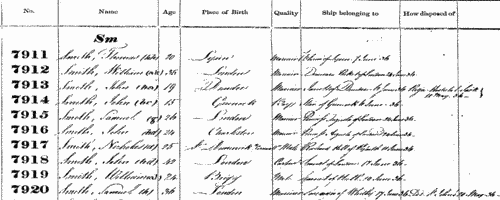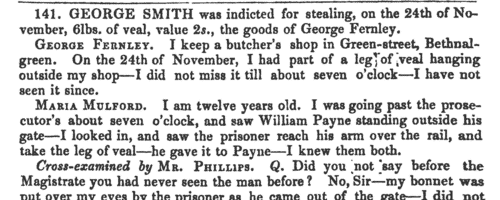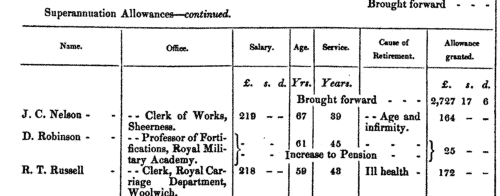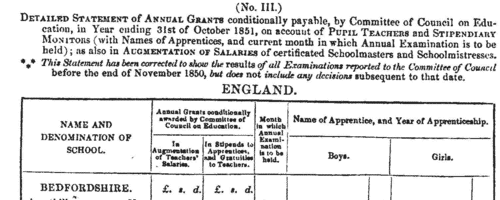Dutch Surname Ancestry ResultsOur indexes 1000-1999 include entries for the spelling 'dutch'. In the period you have requested, we have the following 76 records (displaying 31 to 40): Single Surname Subscription | | | Buying all 76 results of this search individually would cost £458.00. But you can have free access to all 76 records for a year, to view, to save and print, for £100. Save £358.00. More... |
These sample scans are from the original record. You will get scans of the full pages or articles where the surname you searched for has been found. Your web browser may prevent the sample windows from opening; in this case please change your browser settings to allow pop-up windows from this site. Inhabitants of Wiltshire
(1830)
Pigot & Co.'s National Commercial Directory lists traders, farmers and private residents in the county.DUTCH. Cost: £6.00.  | Sample scan, click to enlarge

| Liverpool Voters: Burgesses and Freemen
(1832)
A poll for the election of Members of Parliament for the Borough of Liverpool, between William Ewart esquire (E), Lord Viscount Sandon (S), Thomas Thornely esquire (T) and Major-General Sir Howard Douglas, baronet (D), took place on 12 and 13 December 1832. The poll book lists all voters with full name (surname first), occupation, address, and initials indicating for whom they voted. The lists are in six sections: Everton, Kirkdale, the parish of Liverpool, Toxteth Park, West Derby, and Liverpool burgesses and freemen. All householders of property worth £10 a year of more were entitled to vote.DUTCH. Cost: £6.00.  | Sample scan, click to enlarge

| Petitioning Creditors and Solicitors
(1835)
Principal creditors petitioning to force a bankruptcy (but often close relatives of the bankrupt helping to protect his assets): and solicitorsDUTCH. Cost: £6.00.  | Sample scan, click to enlarge

|  British merchant seamen
(1835-1836) British merchant seamen
(1835-1836)
At this period, the foreign trade of ships plying to and from the British isles involved about 150,000 men on 15,000 ships; and the coasting trade about a quarter as many more. A large proportion of the seamen on these ships were British subjects, and so liable to be pressed for service in the Royal Navy; but there was no general register by which to identify them, so in 1835 parliament passed a Merchant Seamen's Registration Bill. Under this act this large register of British seamen was compiled, based on ships' crew lists gathered in British and Irish ports, and passed up to the registry in London. Each seaman was assigned a number, and the names were arranged in the register by first two letters of the surname (our sample scan shows one of the pages for 'Sm'); in addition, an attempt was made to separate out namesakes by giving the first instance of a name (a), the second (b), and so on. But no effective method was devised to prevent the same man being registered twice as he appeared in a second crew list; moreover, the original crew lists were clearly difficult for the registry clerks to copy, and some of the surname spellings appear to be corrupted. A parliamentary committee decided that the system devised did not answer the original problem, and this register was abandoned after less than two years: but it is an apparently comprehensive source for British merchant seamen in 1835 to 1836. The register records the number assigned to each man; his name; age; birthplace; quality (master, captain, mate, 2nd mate, mariner, seaman, fisherman, cook, carpenter, boy &c.); and the name and home port of his ship, with the date of the crew list (usually at the end of a voyage). Most of the men recorded were born in the British Isles, but not all (for instance, Charleston and Stockholm appear in the sample scan). The final column 'How disposed of' is rarely used, and indicates those instances where a man died, was discharged, or deserted his ship during the voyage.DUTCH. Cost: £8.00.  | Sample scan, click to enlarge

| London and Middlesex crimes tried at the Central Criminal Court: victims and witnesses
(1836)
Henry Buckler copied in shorthand the proceedings of trials at the Central Criminal Court in London, and his transcripts were printed. This volume (iii), from 1836, covers sessions i to vi of the Copeland mayoralty of 1835 to 1836. The bulk of the cases were from London and Middlesex, with separate sections for Essex, Kent and Surrey, but, preceding all these, Capital Convictions. The names of the accused are annotated with an asterisk to show if they had previously been in custody; an obelisk indicates a known associate of bad characters. Most cases resulted in a guilty verdict, and a large proportion of these led to a sentence of transportation to Australia. This index covers the victims, witnesses (including constables) and others incidentally named in the London and Middlesex cases of March 1836.DUTCH. Cost: £6.00.  | Sample scan, click to enlarge

| Dissolutions of Partnerships
(1837)
Trade partnerships dissolved, or the removal of one partner from a partnership of several traders: in England and Wales
DUTCH. Cost: £6.00.  | Sample scan, click to enlarge

|  London Policemen
(1830-1842) London Policemen
(1830-1842)
The Metropolitan Police Register of Joiners (MEPO 333/4) lists policemen joining the force through to 31 December 1842 (to warrant number 19892). The register is alphabetical, in so far as the recruits are listed chronologically grouped under first letter of surname. It is evidently a continuation of a similar earlier register, not closed until its alphabetical sections were filled: consequently, there are no entries in this register for the initial letters N, O, Q, U, V, X, Y or Z; and the sections of this register start at different dates - A 18 April 1840 (warrant number 16894); B 11 December 1830 (5570); C 7 September 1830 (4988); D 27 May 1833 (8445); E 15 December 1838 (14476); F 30 March 1832 (7372); G 1 December 1835 (11,184); H 25 April 1832 (7457); I and J 13 February 1837 (12449); K 2 January 1838 (13457); L 3 October 1834 (9905); M 15 November 1832 (7999); P 4 October 1831 (6869); R 4 September 1837 (13021); S 30 March 1835 (10366); T 6 April 1840 (16829); W 30 December 1833 (9096). The register gives Date of Appointment, Name, Number of Warrant, Cause of Removal from Force (resigned, dismissed, promoted or died), and Date of Removal. Although the register was closed for new entrants at the end of 1842, the details of removals were always recorded, some being twenty or more years later. Those recruits not formerly in the police, the army, or some government department, were required to provide (normally) at least two letters of recommendation from persons of standing, and details of these are entered on the facing pages: the names in these are indexed separately - this index refers only to the police constables. Where a recruit was only recently arrived in the metropolis, the names and addresses of the recommenders can be invaluable for tracing where he came from.DUTCH. Cost: £8.00.  | Sample scan, click to enlarge

| Trustees and Solicitors
(1842)
Trustees appointed to take over bankrupts' estates in England and Wales, and their solicitors. Trustees are often friends or relatives of the bankrupt: and/or principal creditors
DUTCH. Cost: £6.00.  | Sample scan, click to enlarge

| Deaths: Excise Officers
(1847)
The annual return for 1847 of 'Allowances or Compensations granted as Retired Allowances or Superannuations in all Public Offices or Departments' lists new compensation allowances (usually for loss of office under reorganization), superannuation allowances (for retirement), and temporary allowances (for sickness or accident) arising during the year; and the cessation of such allowances by death (or occasionally because the individual has been re-employed, or the allowance has remained unclaimed for six years). The format of the returns varies from department to department, but generally the details of a new allowance give full name or surname and initials, office, age, length of service, affliction, and rate of allowance. The lists of deaths give full name or surname and initials, office, date of death, and the amount paid in the year. Throughout the death returns the column 'annual amount' means 'the amount actually paid out during 1847', rather than the yearly amount of the allowance.
DUTCH. Cost: £6.00.  | Sample scan, click to enlarge

| Pupil Teachers in Lancashire: Boys
(1851)
The Committee of Council on Education awarded annual grants for the training and support of pupil teachers and stipendiary monitors in schools in England, Wales, Scotland, the Isle of Man and the Channel Islands. Pupil teachers started training between the ages of 13 and 15, and 'must not be subject to any bodily infirmity likely to impair their usefulness as Pupil Teachers, such as scrofula, fits, asthma, deafness, great imperfections in the sight or voice, the loss of an eye from constitutional disease, or the loss of an arm or leg, or the permanent disability of either arm or leg, curvature of the spine, or a hereditary tendency to insanity'.
They also had to obtain certificates from the managers of the school (and their clergyman, in the case of Church of England schools) as to their moral character and that of their family; good conduct; punctuality, diligence, obedience, and attention to duty; and attentiveness to their religious duties.
This detailed statement in the annual report of the committee for the year ending 31 October 1851 lists schools by county, giving:
1. Name and Denomination of School, with these abbreviations - B, British and Foreign School Society; F. C., Free Church of Scotland; H. C., Home and Colonial School Society; N., National Society, or connected with the Church of England; R. C., Roman Catholic Poor-School Committee; Wesn., Wesleyan Methodist.
2. Annual grants conditionally awarded by the committee in augmentation of teachers' salaries, and in stipends to apprentices, and gratuities to teachers.
3. Month in which annual examination was to be held.
4. Names of apprentices, giving surname and initials, and year of apprenticeship. Stipendiary monitors are indicated by (S. M.).DUTCH. Cost: £6.00.  | Sample scan, click to enlarge

|
Research your ancestry, family history, genealogy and one-name study by direct access to original records and archives indexed by surname.
|













